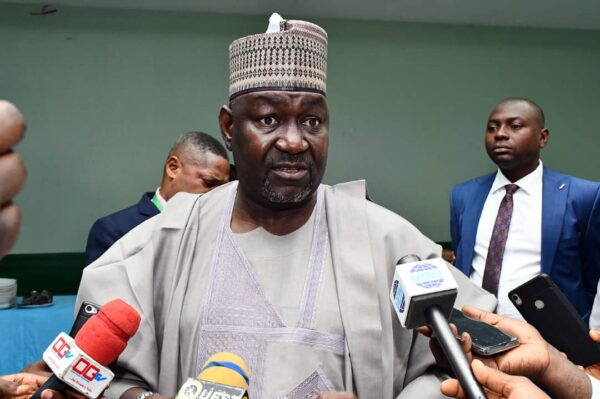BY GABRIEL OGUNJOBI
Idowu Abimbola was leaning on one of the moored boats, knitting new silk to fix a tangled fishing net. The sun had set, and while many fishers had retired to their shelters, his hope to go fishing the next day was to tarry by the shore that dusk and fix his wrecked equipment. He appeared frustrated by the hurdle that has become the nightmare of every fisher in Ibeju-Lekki area of Lagos state. When fishers cast the net upon the ocean, they paddle their boats back to the shore and wait for a few hours or sometimes overnight — expecting that varieties of fishes would have been trapped on their return. This was the fishing culture for decades until dredging began on the Lekki water around 2019.
In December 2020, a lawmaker in the house of representatives raised a motion against the Dangote Group and Lekki Port LFTZ over “an unprecedented dredging of the sea, causing unquantifiable erosion of the seashore, leading to the destruction of building and fishing equipment and making fishing almost impossible”.
Aliko Dangote, 65, Africa’s richest man embarked on a project: building the largest single-train refinery in the world. The $19.5 billion project has attracted the bourgeoisie: Femi Otedola, oil magnate, and Bola Tinubu, a former Lagos state governor and now a 2023 presidential hopeful. President Muhammadu Buhari also visited the project site in March. This refinery, built in a fit of pride, is meant for a period like this, when the nation experiences economic downturn from dwindling global fuel price and long-held fuel subsidy scandals. The government-owned Nigerian National Petroleum Corporation (NNPC) has acquired a 20 per cent stake in the investment, hoping to end its gasoline imports through Dangote’s refinery. The refinery is complemented by a fertilizer plant and a private seaport for the receipt of all cargoes for the construction purposes.
Advertisement
With ships berthed nearby at the Lekki jetty, both the activities at the jetty and the oil refinery pose an environmental threat to indigenous fishing communities near the Atlantic Ocean. The fishes are disappearing, and the fishers’ shelters are being washed away by the Atlantic, displacing the low income-earners living on the shoreline. To these hundreds of victims, a refinery is a curse rather than a blessing.
OIL, YES. FISHING, NO!
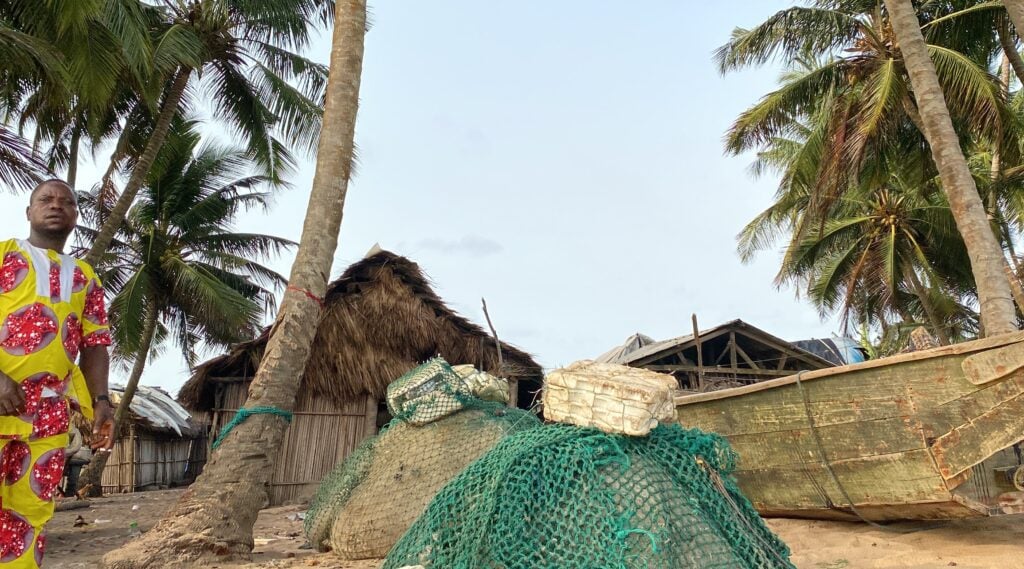
The woes betiding the likes Idowu Abimbola are a constant reminder of the lawmaker’s concern for the fishing community. The fisherman had hoped to catch fish when he laid his net at the Lekki jetty axis of the Atlantic. As the net sunk deep into the water, a dredging bar buried underneath hooked it. Abimbola would later recover the net awash to a shore, dirty and useless. So, he paddled the boat back home. “Sometimes, we see the engineers dredging on the sea but we can’t say anything,” Abimbola complains.
Advertisement
A bundle of silk sells for N20,000. When Abimbola’s net was wrecked from that single expedition, it cost him more than N100,000 to procure five bundles. It is easier for fishers to run into debts with the dwindling economy of the fishing business.
Back at the jetty where he narrated his ordeal, he is joined by a co-fisherman, Musemiu Safiriyu, who gave no more than a hint that their predicaments were double. Apart from their financial struggles with damaged boats and fishing nets, climate change threatens housing in the community – and its impacts are aggravated by unregulated engineering works on Lekki water.
“Before now, if you were hungry, you just need to fuel the boat with N1,000 and stay at the tip of ‘Olokun’ (the Yoruba lingo for the sea), your bucket will be full with fish to eat and merry for days,” one of the women I met at the jetty on my second visit said, attempting to compare the old with the current situation.
Although Nigeria has an Atlantic coastline of 853km (530 miles), it remains Africa’s largest importer of foreign fish, with a demand for more than 3m metric tonnes each year. Some of the fishers bridging the demand gap are currently plagued by the nation’s glaring priority for oil refining.
Advertisement
The indigenous fishers say they now have to travel past 20 meters on the sea before they are able to fish at all, buttressing the point about fish vanishing. On my second day at the shore, I met these women relaxing under the shade, there were black-coloured bowls of fish, half-full.
“I was born into fishing over 50 years ago now. When our fathers were alive, the village Apaakin Oniyanrin was where we fished but we cannot do that there anymore. This year, we might have to leave our home because of the violence of the Olokun fast approaching us,” Olasunkanmi Adelaja, a fisherwoman said.
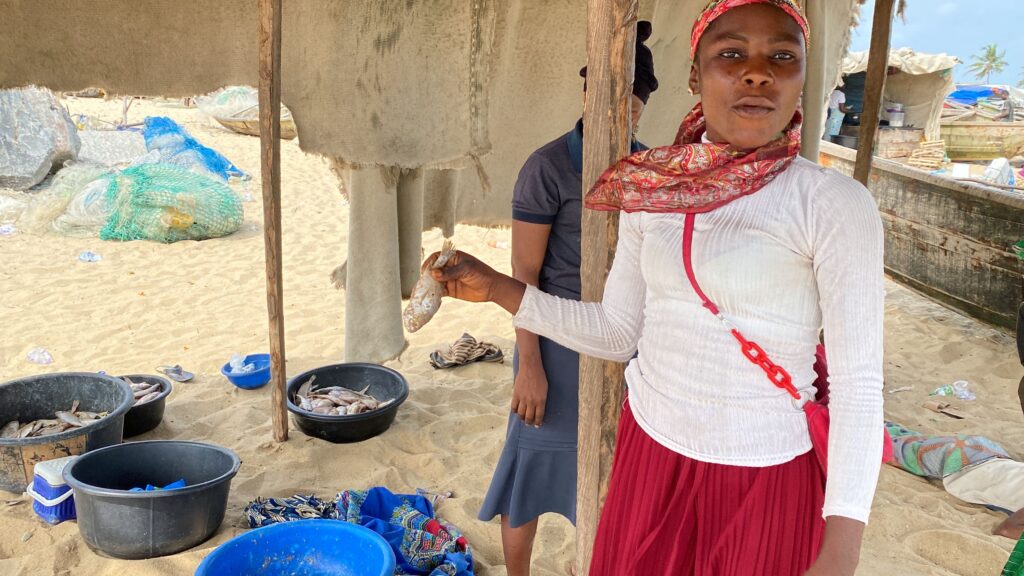
In the middle of our conversation, someone came to break the news that ended our chat. Safiriyu, whom I had met the evening before, had gone missing on the sea.
Advertisement
He was found after a long haul. When I called him some days after, he told me his boat broke down in unfamiliar terrain on the sea, making it difficult for people to come to his aid on time. Fishers would not have to risk their lives paddling boats such long distances if fishes were within reach.
BURROWED HOMES
Advertisement
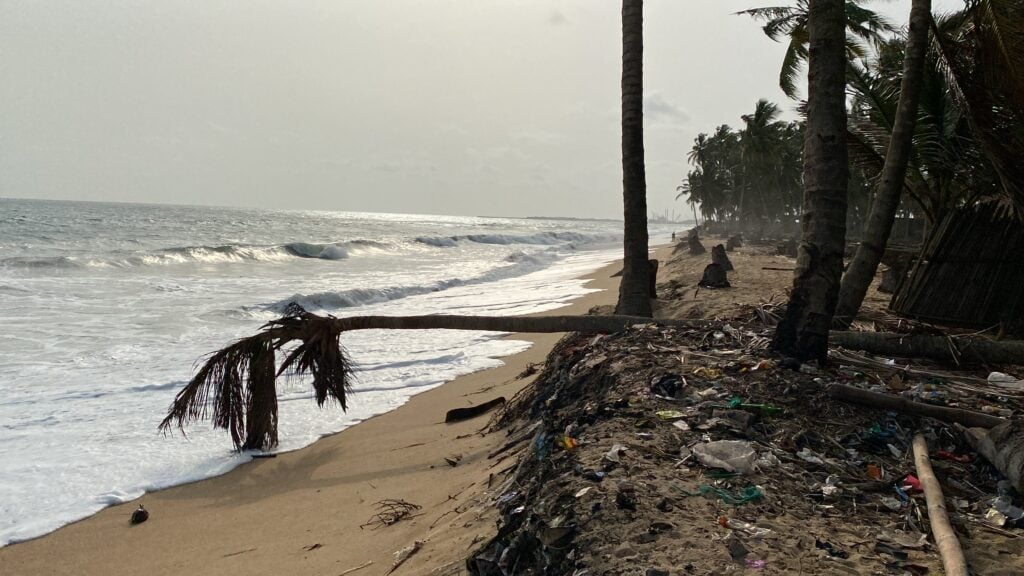
When the ocean waves hurl violently at Apaakin, like other towns inside Ibeju where it is no longer possible to fish, it burrows through the coconut trees protecting the houses and pulls them down. Again, it rushes forward, collapsing the houses, mostly built of sand gathered at the shores and covered with palm front. The surge is no respecter of both the living and the dead; as it threatens human dwelling places, the graves are equally washed away.
In one of such turbulent moments, Orlando Oseni’s house was wrecked by the ocean tide in 2020. From what the 70-year-old man said, the village has not experienced such a sea rise of that magnitude destroying properties.
Advertisement
“It is no other thing than the construction work at the jetty,” he said. “As you can see, there are no boats here again because we moved all of them to the jetty since we cannot fish again.”
His brothers’ houses were also affected, but Oseni managed to rebuild his. Some residents have since relocated. Apaakin Town Hall is halved by the water as well, leaving the remainder for people to defecate in its rubble.
Advertisement
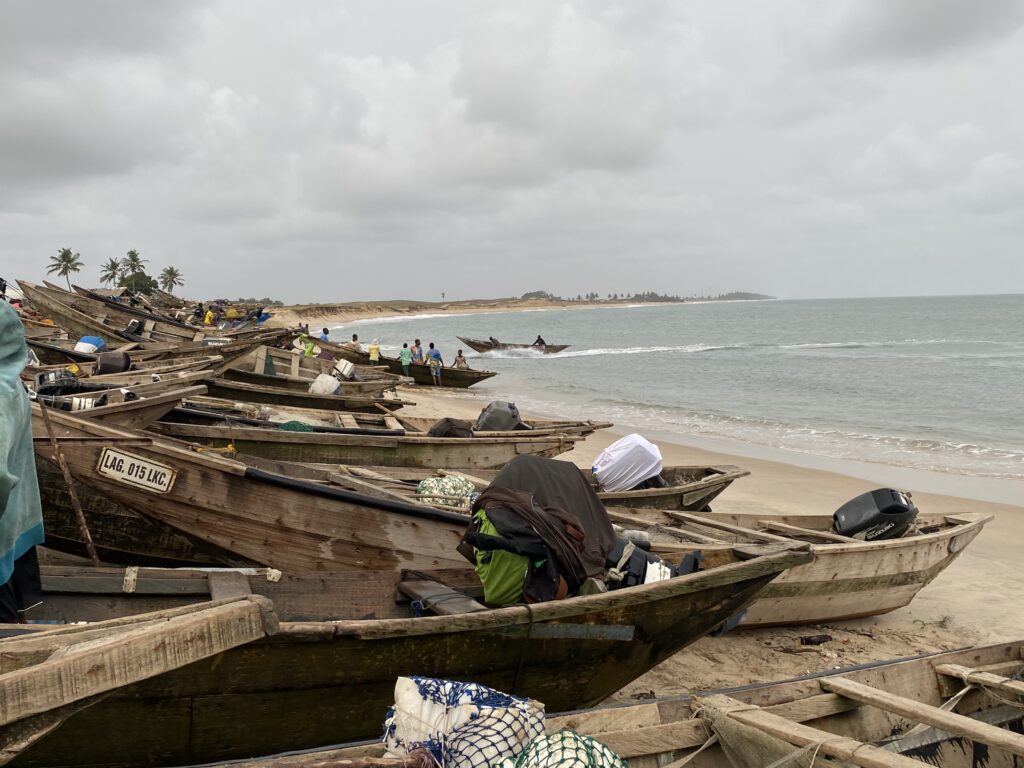
Oseni warned that there will be more collapses if pillars are not built at the shore before the rainy season later in the year.
“And we have told them but nothing is being done about our plight,” he said.
Anthony Chiejina, chief corporate communications officer of the Dangote Group, said the company is not aware of the plights of the Ibeju Lekki fishing community. “Nobody has brought that complaint to us,” he said, before inviting the journalist for a media tour of the project site for an “explanation of the processes”.
At the inception of the refinery project, Dangote Group had promised climate-friendly refining, but this investigation showed that the realities are different for fishermen and women at Ibeju Lekki.
Our Geographic Information System (GIS) investigation confirmed that the refinery activities have plunged the Atlantic causing drastic impacts on the communities. As a result of this, to eke out a living has become a nightmare for the fishers, with heightened climate change threats in the last few years.
Satellite imageries show significant progress on the Atlantic shore in Ibeju-Lekki.
Construction of the Dangote Refinery began in 2016 with excavation and preparation of the site for further development. This preparation involves sand filling of the ocean basin, especially for the construction of a seaport. The sand filling was used to extend the coastal land surface into the Atlantic Ocean. Due to this, the ocean shorelines continued to extend inland towards the coastal communities of Ibeju Lekki.
Levelling the ocean allowed the water to extend into the land, progressively redefining its shorelines. The Atlantic ocean’s boundaries have progressed inland to about 57 meters since 2015, the year before construction started. Between 2015 and 2018, the shoreline extended inland by 12 meters and between 2018 to 2022 it extended to an additional 45 meters.
Speaking with this reporter, Steve Trent, founder of the Environmental Justice Foundation, raised an alarm about the activities on the Atlantic being consequential on climate change.
“The ocean is the world’s largest active carbon sink and the greatest nature-based solution for climate change mitigation we have. It gives us every second breath, producing vastly more oxygen than all the world’s forests combined, and absorbs around a third of the CO2 we pump out,” Trent said.
“But this only applies to a healthy ocean, and currently, our marine ecosystems are under severe stress. With fish population plummeting around the world due to overfishing and harmful activities, we are not only jeopardising marine ecosystems, we are fuelling climate breakdown.”
In Lagos, a fisherman risks his life to catch fish in the longest distance he has ever travelled on the Atlantic because a proposed refinery makes fishing herculean. With Nigeria’s regulatory failure on oil refineries, the nation’s old heritages — farming and fishing — are at a low ebb.
This report was funded under Health of Mother Earth Foundation’s fossil politics programme. You can read the first part HERE.




